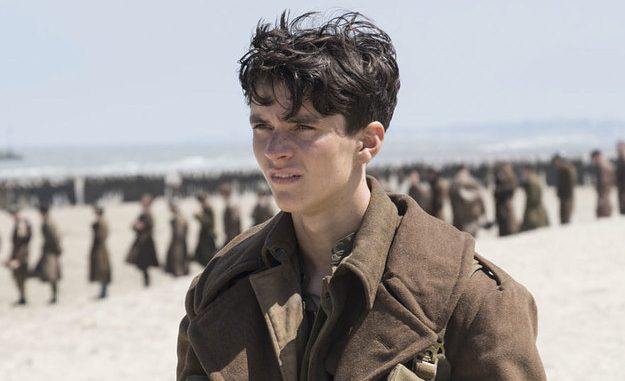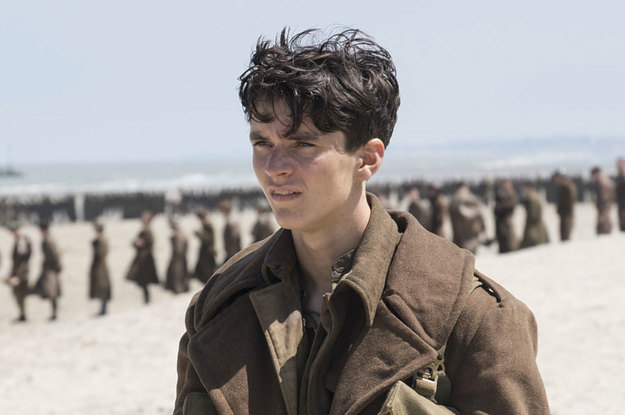

Warner Bros. Pictures
Soldiers on a pier in Dunkirk.
It’s the damnedest thing, the way Christopher Nolan’s monumental new World War II movie uses its actors. They’re utilities, really, place markers. Dunkirk doesn’t have characters so much as it has familiar faces there for orientation purposes. Which is helpful, in a film that jumps between three locales and three different time frames to depict the famous evacuation of British troops from the beaches of Northern France. There is, for instance, Tom Hardy in a single-seat fighter plane out over the English Channel in the section set in the air, wearing an oxygen mask (dude loves a mask) that reduces him to a pair of eloquently worried eyes for most of the runtime.
There’s Cillian Murphy getting pulled out of the water, wide-eyed with shell shock, onto one of the hundreds of private boats that were requisitioned to help get as many men as possible home from the coastal city where they’d been surrounded by German forces. There’s pop star Harry Styles, in his movie debut, tucked into the group of men who have to swim back to land after their ship is bombed. His character, one of three pointy brunette boys who end up casting their lots together while speaking almost not at all, is listed as “Alex,” a name which, if it was mentioned at all onscreen, I never caught. Murphy’s character gets no name at all — he’s just “Shivering Soldier.”
Warner Bros. Pictures
Aneurin Barnard, Kenneth Branagh, James D’Arcy, Tom Glynn-Carney, Barry Keoghan, Jack Lowden, Mark Rylance, and Fionn Whitehead are in there as well, playing men who might have names or might not — there’s not a lot of interest in exposition and introductions. Rylance plays a civilian sailor who, with his son (Glynn-Carney) and another boy (Keoghan), heads into dangerous waters to help with the rescue effort. Lowden is one of the pilots to accompany Hardy on the flight toward France. Branagh is a navy commander and D’Arcy is an army colonel, the two overseeing the agonizingly slow evacuation from a pier that’s an occasional target for German bombers. They all provide points of view on a massive effort.
Dunkirk isn’t indifferent to individuals so much as it takes place on a scale not meant to accommodate them — it’s focus is too wide, IMAX-wide if you can swing it and have the film fill your field of vision. It’s a war movie that pushes back against all the usual expectations of war movies, with their focus on a humanizing backstory and distinguishing acts of bravery which set someone apart from the crowd, those tried-and-true ways to emphasize which deaths matter. You never see the faces of German soldiers on screen in Dunkirk, or bother with much context on the greater conflict. It isn’t the story of a victory but of a miraculous escape, in the wake of what British Prime Minister Winston Churchill called “a colossal military disaster.” Its constant, nerve-racking tension comes from its three levels of adrenaline-addled immediacy.
Warner Bros. Pictures
Tom Glynn-Carney and Cillian Murphy.
Dunkirk is a film that does its thinking on the level of militaries and nations rather than of men on the ground. It transmit the desperate math of a situation in which there are 400,000 man on that shore, and that the optimistic number they hope to get out before Axis troops close in is 45,000. The breadth of the first shot — in which Dunkirk shows the beach, broad and speckled with foam and filled with soldiers lined up for boats that have been coming slowly — is stunning and terrifying at once. It’s an image of a mass of men who are less than 50 miles from home but who have no way to close the distance, an army trying to hold itself together as a larger organism instead of a group of frantic humans clawing to survive.
This approach might sound chilly, but Dunkirk turns out to be one of the best things Nolan has ever done, a cerebral act of shock and awe that plays into all of his strengths as a filmmaker. Characters have never been one of them, aside from the obsessive men he adores in ways that indicate they’re the only figures onscreen he really relates to, attempting to fit worlds around them rather than the other way around. There’s a reason Nolan’s greatest film, The Prestige, is the one that doesn’t try to normalize the monstrous sacrifices its dueling protagonists make for their craft. In Dunkirk, there aren’t really characters, and there’s no space for families, love interests, or the other human dramas Nolan can barely pretend to take interest in. In Dunkirk, obsession makes sense, because all of its characters are united in the same large-scale goal.
Warner Bros. Pictures
Fionn Whitehead
Dunkirk suggests just how much pulling back suits Nolan, and not just in the grandeur of big shots like the one in which a slew of soldiers’ faces gaze fearfully up at an approaching enemy aircraft, but in terms of emotion. The film is constructed like a WWII answer to Inception — another puzzle box in which the story of the fighter planes takes place over an hour, the story of the small boats takes place over a day, and the story of the army on the beach takes place over a week. The way they’re cut together, intersecting at different points and showing us the same events from different perspectives, might come across as a distancing gimmick in a film driven by characters. But Dunkirk is driven by action, and its temporal complexity allows it to be about action and waiting at the same time, a ticking-clock sound underlying scenes and serving as a motif in Hans Zimmer’s score.
Where other war movies tend to instinctively close in on personal stories, Dunkirk attempts to grapple, sometimes almost in the abstract, with what it means to be part of a collective, to be just one of a sea of uniformed bodies presented in battle. For the young men on the beach, played by Barnard, Styles, and Whitehead, it’s a terrifying prospect, as they search for a way to not be in the part of the army that, they’re sure, is set to be captured or killed. For Hardy up above and Rylance down on the water it’s inspiring, urging them into feats of potential sacrifice for the greater good. If anything, that’s what Dunkirk is about — what it means to go against all animal instincts of personal survival to risk your life for a community.
Warner Bros. Pictures
When it arrives at its ending, the flicker of sentimentality present in its salute to the stiff upper lip of different figures in different strata is both surprising and earned. Dunkirk is a film that indicates the tide coming in by showing bodies washing on shore, and that finds its greatest moment of grace in a man coasting knowingly toward doom. It isn’t a standard war movie, but it sure is some beautiful, difficult thing.
Got a confidential tip? Submit it here.

